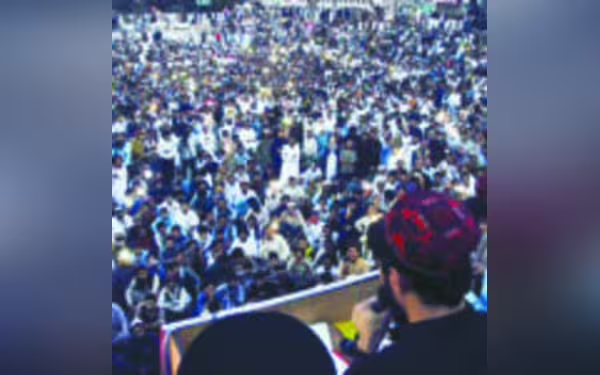Saturday, November 16, 2024 09:50 PM
The Malignant Alliance: PTM's Hidden Agenda
- PTM's connections with anti-state forces raise concerns.
- Manipulation of tribal customs undermines Pashtun unity.
- PTM's narrative distorts the reality of security challenges.
 Image Credits: pakistantoday
Image Credits: pakistantodayThe Pashtun Tahafuz Movement's alliances and actions raise serious concerns about its true agenda.
The Pashtun Tahafuz Movement (PTM) has emerged as a significant force in Pakistan, ostensibly advocating for the rights of the Pashtun people. However, a closer examination reveals that its agenda may extend beyond merely protecting the interests of a specific community. This raises critical questions about whether PTM's objectives align with Pakistan's national interests or if they serve the broader agenda of anti-Pakistan elements.
At first glance, PTM appears to champion the rights of the Pashtun community, but its alliances and rhetoric suggest a more complex narrative. The movement's connections with anti-state forces and foreign actors are evident, as its messaging often echoes the goals of those who seek to destabilize Pakistan. Notably, PTM propaganda is being amplified by Afghan nationals, particularly those with pro-India sentiments, who utilize international media platforms to present a distorted view of the situation in Pakistan.
Indian media outlets have played a crucial role in promoting PTM narratives, providing a platform for Afghan nationals to disseminate anti-Pakistan sentiments. This collaboration is not merely coincidental; it reflects a coordinated strategy aimed at tarnishing Pakistan's reputation on the global stage. Furthermore, these media channels have also given space to notorious terrorist groups, such as Fitna-al-Khawarij (FaK), allowing them to propagate their anti-Pakistan agendas.
The case of Ehsanullah Ehsan, a former spokesperson for terrorist organizations, writing articles against Pakistan, underscores the troubling connections between PTM and groups that have long caused turmoil in the region. This convergence of narratives highlights a shared objective: to incite unrest within Pakistan and undermine efforts to combat terrorism.
PTM's manipulation of traditional tribal customs, such as the Jirga, further illustrates its detrimental impact on the very culture it claims to protect. Instead of fostering unity and peace, PTM exploits these traditional mechanisms to sow discord among Pashtun communities. The so-called "Pashtun National Court" serves to deepen divisions, promoting anti-state sentiment and eroding the cohesion that has historically characterized Pashtun society.
Despite its claims of being a peaceful movement, PTM's actions reveal a different agenda. The movement employs anti-democratic tactics, including hate speech and incitement to bigotry, while remaining silent on the atrocities committed against the Pashtun people by terrorist organizations like FaK. This selective outrage demonstrates a troubling disregard for the suffering of innocent Pashtuns, as PTM focuses solely on issues that align with its narrative.
The recent five-day ceasefire announced by FaK to facilitate PTM's activities speaks volumes about the nexus between these groups and their shared objectives. PTM's messaging perpetuates the false notion that the Pakistani state is responsible for the war on terror imposed on the Pashtun people. This dangerous half-truth fuels anger and resentment among Pashtuns, obscuring the reality that the tribal areas bordering Afghanistan have long faced security challenges due to their proximity to instability.
Pakistan's security forces have made significant sacrifices to restore peace in these regions, reflecting a genuine commitment to the development and security of the tribal areas. However, PTM's manipulation of facts, including the use of fabricated news and images, reveals its willingness to exploit the very people it claims to represent for its political gain.
The actions and alliances of PTM raise serious doubts about its stated objectives of promoting peace and justice for Pashtuns. The movement appears to be driven by a more intrusive agenda that resonates with anti-Pakistan forces, aiming to create division and unrest rather than addressing the genuine challenges faced by the Pashtun people. Meanwhile, Pakistan's state and security apparatus continue to strive for peace and development in the merged districts, despite facing enormous challenges. It is crucial for all stakeholders to recognize PTM for what it truly is: a foreign-backed proxy thriving on divisive politics rather than offering real solutions to alleviate the suffering of its people.













